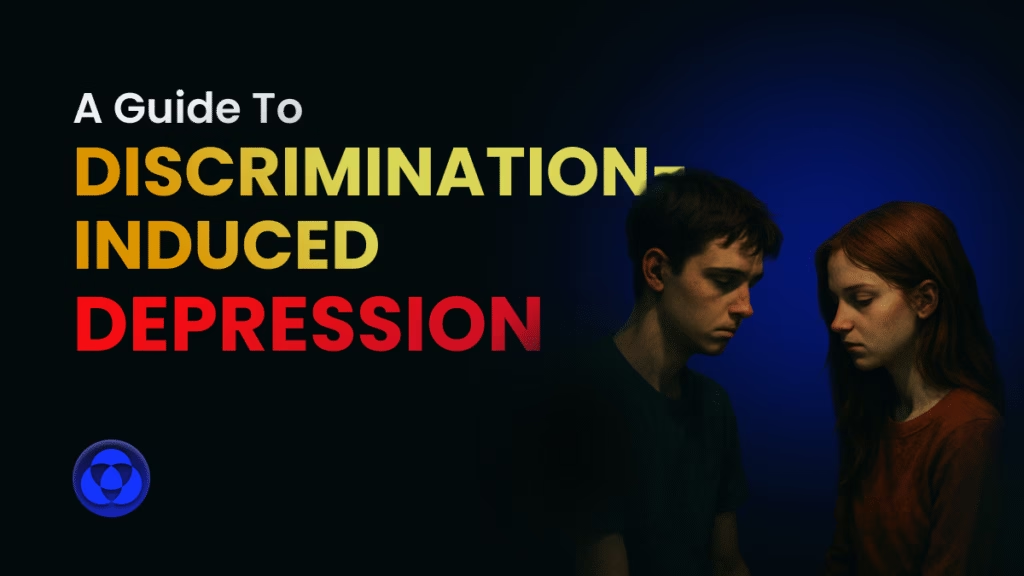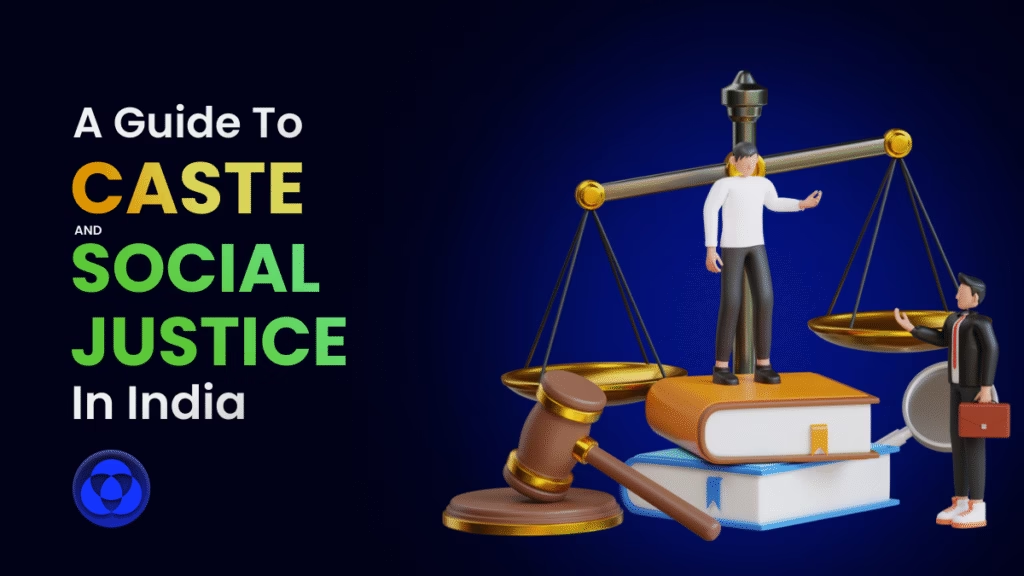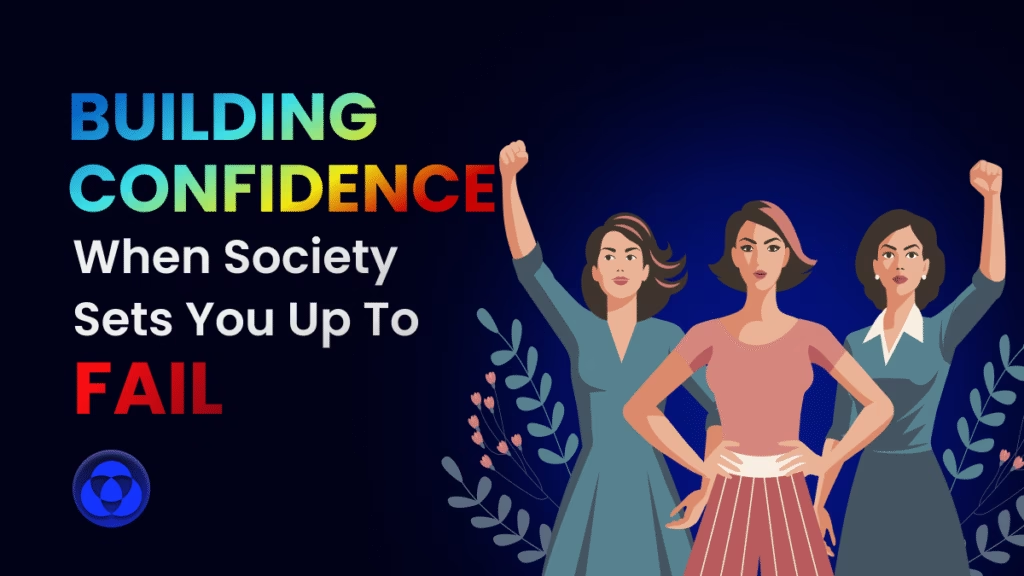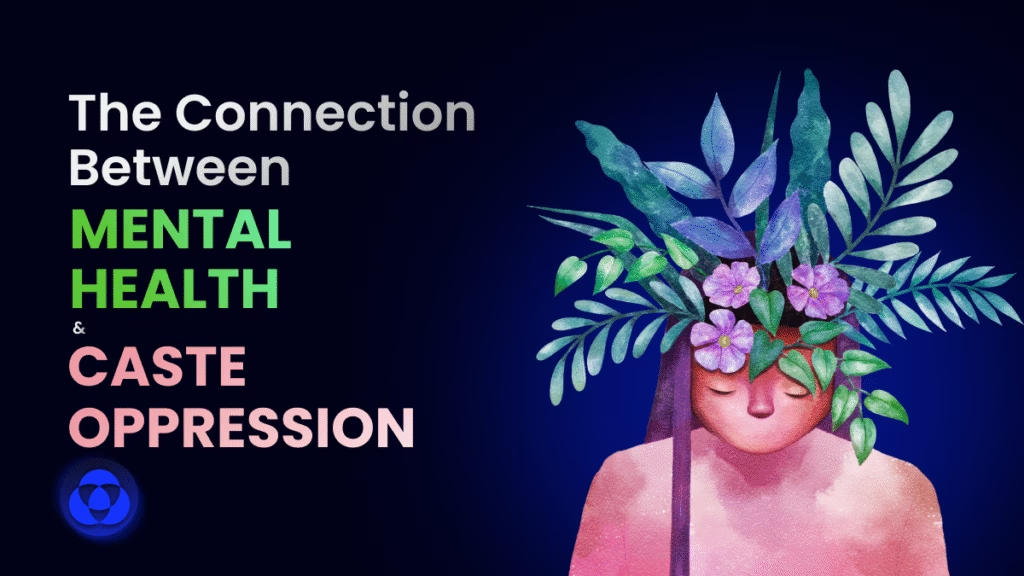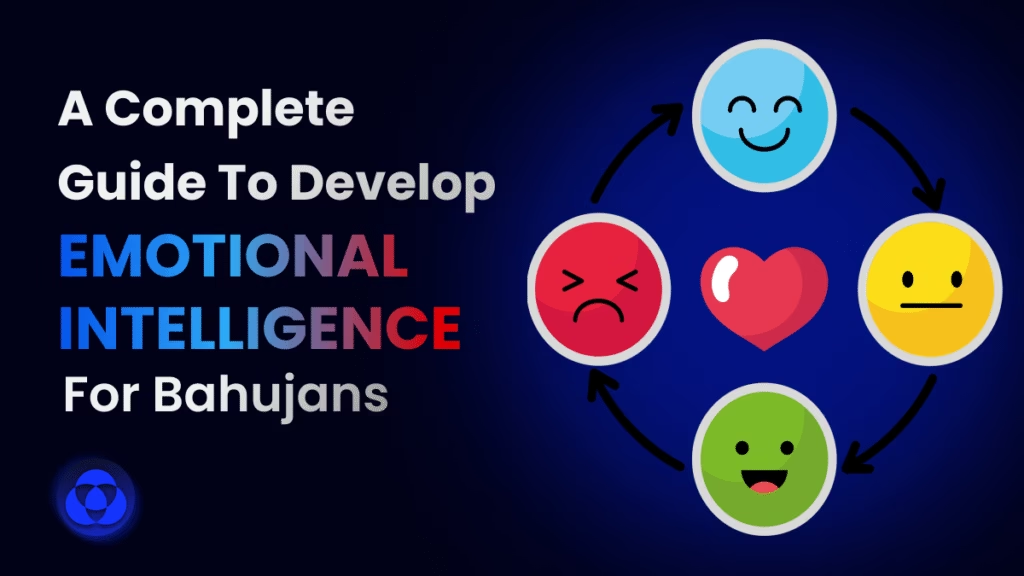Have you ever felt exhausted, hopeless, or mentally drained because of the discrimination you face? For many Bahujans, the constant experience of caste-based bias in education, workplaces, and daily interactions creates a heavy emotional burden that can lead to depression, persistent self-doubt, and emotional numbness. This invisible weight affects not just how we feel about ourselves but how we move through the world.
In this guide, we’ll explore how systemic discrimination contributes to depression, recognize its symptoms, and discover practical steps toward healing. While discrimination may be a persistent reality, your mental wellbeing deserves attention and care. Let’s begin this journey toward understanding and healing together.
Understanding Discrimination-Induced Depression
What Is Depression?
Depression is not just about feeling sad or having a bad day. It is a serious mental health condition that affects how a person thinks, feels, and functions in everyday life. Symptoms may include persistent sadness, a lack of interest in activities, low energy, difficulty concentrating, changes in sleep or appetite, and a deep sense of hopelessness. In some cases, it can lead to thoughts of self-harm or suicide.
Depression can have many causes, including biological, psychological, and social factors. One of the most overlooked social causes in the Indian context is caste-based discrimination.
How Caste Discrimination Contributes to Depression
Discrimination-induced depression happens when someone experiences emotional and psychological distress because they are constantly devalued, excluded, or mistreated based on their identity. For Bahujans, caste is not just a label that sits on a document. It is a reality that affects how others treat you, how systems respond to you, and eventually, how you begin to view yourself.
This kind of oppression is not occasional. It happens across different stages of life, in schools, colleges, workplaces, and even in personal relationships. The emotional pain caused by this constant discrimination can lead to a deep and long-lasting form of depression.
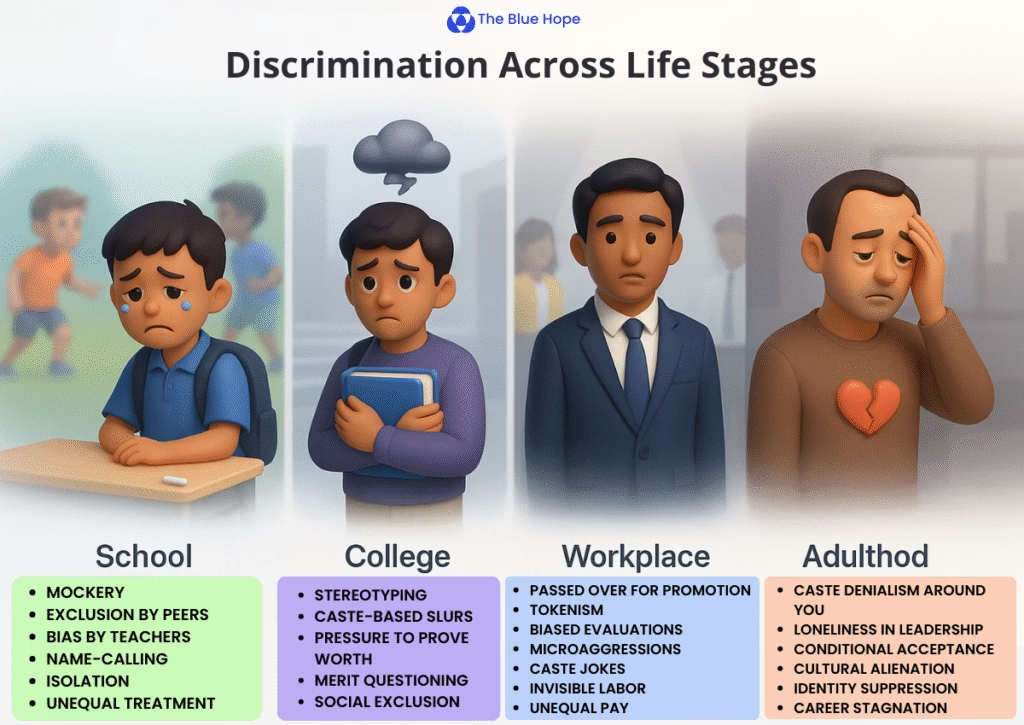
The Psychological Impact of Systemic Discrimination
Facing discrimination again and again creates long-term psychological stress. The mind stays alert, expecting rejection, humiliation, or harm. This constant state of fear and self-protection is emotionally exhausting and affects mental health over time.
Studies show that caste-based discrimination leads to anxiety, low self-esteem, and emotional fatigue. Many Bahujan children face these issues early in life. Whether it is being mocked in classrooms, ignored by teachers, or left out by peers, the message is clear — you are not equal. As these messages are repeated, they begin to shape how young people understand their worth and place in the world.
The Weight of Generational Trauma
The emotional burden of caste discrimination does not only come from personal experiences. Many Bahujans grow up with the stories of pain, violence, and exclusion passed down from parents and grandparents. This is known as generational trauma.
Even if someone has not directly faced violence or humiliation, they may carry the emotional weight of their family’s past. Stories of being denied water from a village well, being attacked for walking on certain roads, or being insulted for going to school become part of their emotional identity.
This history can create deep inner conflict.
How Social Exclusion Deepens Depression
Discrimination is not always loud or obvious. Sometimes, it shows up through social exclusion. Being left out of conversations, being passed over for promotions, or being treated as invisible in professional settings can cause deep emotional pain.
Social isolation caused by exclusion is one of the strongest risk factors for depression. When someone is made to feel like they do not belong, it becomes harder to stay hopeful or confident. Over time, this sense of being “othered” can lead to helplessness.
Even in environments where Bahujans seem to have succeeded, the emotional cost remains. Many feel the pressure to fit in, to avoid discussing caste, and to prove they deserve their place. This constant need to prove one’s worth and to defend one’s presence can erode confidence and increase emotional exhaustion. These experiences are not simply personal challenges. They are part of a larger system that discourages Bahujans from feeling safe or valued.
Mental Health Challenges in Therapy Spaces
Seeking help for mental health is not always easy, and for Bahujans, it can come with an added risk. Mental health professionals may lack awareness about caste and its effects. In some cases, they may dismiss or misunderstand the very real pain caused by caste discrimination.
One person shared their experience by saying, “I started therapy on the recommendation of my psychiatrist, and it went relatively well until I mentioned the casteist remarks from my upper-caste peers. She told me I was generalising an entire community and said it might be a sign of paranoia. That was my last session with her.”
Therapists who are unaware of caste realities can do more harm than good. When someone’s lived experience is invalidated, it leads to more isolation. For Bahujans, this can make it even harder to seek support in the future.
Recognizing Depression Symptoms in the Context of Discrimination
Depression does not look the same for everyone. When it arises in response to discrimination, especially caste-based exclusion, it can show up in specific and sometimes overlooked ways. Recognizing these patterns is a crucial step toward seeking help and understanding your own mental health needs.
How Depression Appears When Rooted in Discrimination
When depression is shaped by ongoing experiences of being marginalized or devalued, the emotional and physical symptoms often carry the weight of that injustice. Some of the most common signs include:
- A persistent sense of not belonging, or feeling unworthy in social, academic, or professional spaces
- Constant alertness or tension in interactions, driven by the fear of judgment, humiliation, or rejection
- Emotional detachment or numbness, which often serves as a coping strategy to manage repeated hurt
- Deep frustration, anger, or helplessness without a clear outlet or space for expression
- Physical symptoms such as chronic fatigue, body aches, or digestive problems, which are often stress-related
- Disrupted sleep patterns, including insomnia or oversleeping
- Loss of motivation or interest in things that once felt meaningful or joyful
Studies have consistently shown that individuals who perceive high levels of discrimination also report significantly higher levels of depressive symptoms. This connection has been observed across different ages and communities, revealing just how deeply oppression affects mental health.
Emotional Patterns Unique to Caste-Based Discrimination
Caste-based discrimination does not only result in sadness or isolation. It produces a complex range of emotional responses tied directly to the nature of the discrimination itself.
People who face caste-based exclusion often report feeling:
- Unwanted or rejected in social and institutional settings
- Humiliated by verbal insults, denial of respect, or microaggressions
- Ashamed, even when they are not at fault, due to deeply internalized stigma
- Frustrated by the repeated need to prove their worth in spaces that question their right to exist
- Discouraged from speaking out or claiming space
- Angry or resentful, especially when silence is the only option
- Helpless in environments where caste operates in subtle but powerful ways
These are not fleeting emotions. When experienced repeatedly and without resolution, they can evolve into chronic emotional states that are deeply linked to depression.
The Psychological Cost of Code-Switching
Many Bahujans, especially those navigating urban or upper-caste-dominated spaces, feel pressured to “code-switch.” This means changing one’s behavior, speech, appearance, or mannerisms to avoid judgment or fit in.
While this may help avoid direct discrimination, it comes at a heavy emotional cost. Constantly adjusting yourself to meet others’ expectations creates inner tension. Over time, this can lead to:
- A sense of inauthenticity or disconnection from your true self
- Emotional exhaustion from trying to maintain a socially acceptable version of yourself
- Anxiety around being “exposed” or not being accepted if your identity becomes known
- A persistent feeling of not being good enough, no matter how hard you try
This daily performance, often invisible to others, contributes silently but powerfully to depression. For many Bahujans, healing begins with the ability to exist without having to constantly edit themselves to be acceptable.te norms. This constant performance takes a significant psychological toll, contributing to feelings of inauthenticity and emotional depletion.
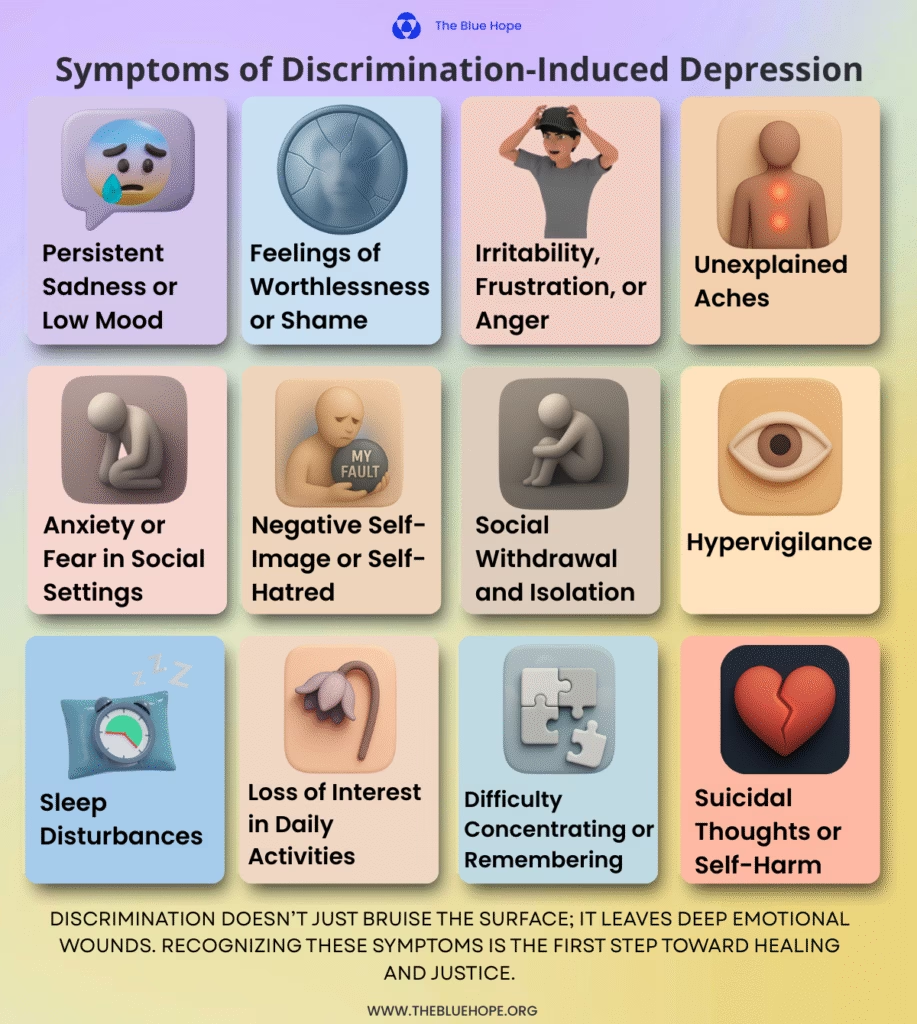
Strategies for Managing Depression
While systemic change is necessary to address the root causes of discrimination, there are practical steps you can take to manage depression and protect your mental health.
Seeking Professional Support
Finding the right mental health professional can make a tremendous difference in your healing journey. Organizations like The Blue Dawn aim to provide access to therapists who understand the intersection of caste and mental health. While these resources may be limited, they represent an important step toward culturally responsive care.
When seeking therapy, it’s okay to ask potential therapists about their understanding of caste-based discrimination and how it affects mental health. A therapist who acknowledges these realities will be better equipped to support your healing process.
Developing a Structured Daily Routine
Creating structure in your day can help manage depression symptoms. Establishing a daily schedule brings consistency and a sense of control when discrimination makes the world feel unpredictable.
Try to create a balanced routine that includes:
- Regular sleep and wake times
- Nutritious meals
- Physical activity
- Work or study periods
- Rest and leisure time
- Social connection
Breaking your day into manageable tasks can make overwhelming feelings more manageable. Remember to celebrate small accomplishments—they matter, especially when depression makes everything feel more difficult.
Building a Supportive Community
Finding people who understand your experiences can be profoundly healing. Research shows that social support, particularly from members of your own community, can significantly moderate the impact of discrimination on mental health.
Look for:
- Community organizations focused on Bahujan rights and wellbeing
- Online forums and social media groups where people share similar experiences
- Friends and family members who validate your experiences
- Mentors who have navigated similar challenges
Remember that isolation often intensifies depression, while connection creates resilience. Even connecting with one person who understands can make a difference.
Practicing Mindfulness and Self-Care
Mindfulness is paying attention to the present moment without judgment. It has been shown to reduce stress and improve overall wellbeing. For those dealing with discrimination-induced depression, mindfulness can help create space between painful experiences and your response to them.
Simple mindfulness practices include:
- Deep breathing exercises
- Mindful walking, focusing on each step and your surroundings
- Body scan meditations to release physical tension
- Mindful eating, fully engaging with the sensory experience of food
Self-care isn’t selfish; it’s necessary. Make time for activities that restore your energy and bring you joy, whether that’s reading, creating art, spending time in nature, or connecting with loved ones.
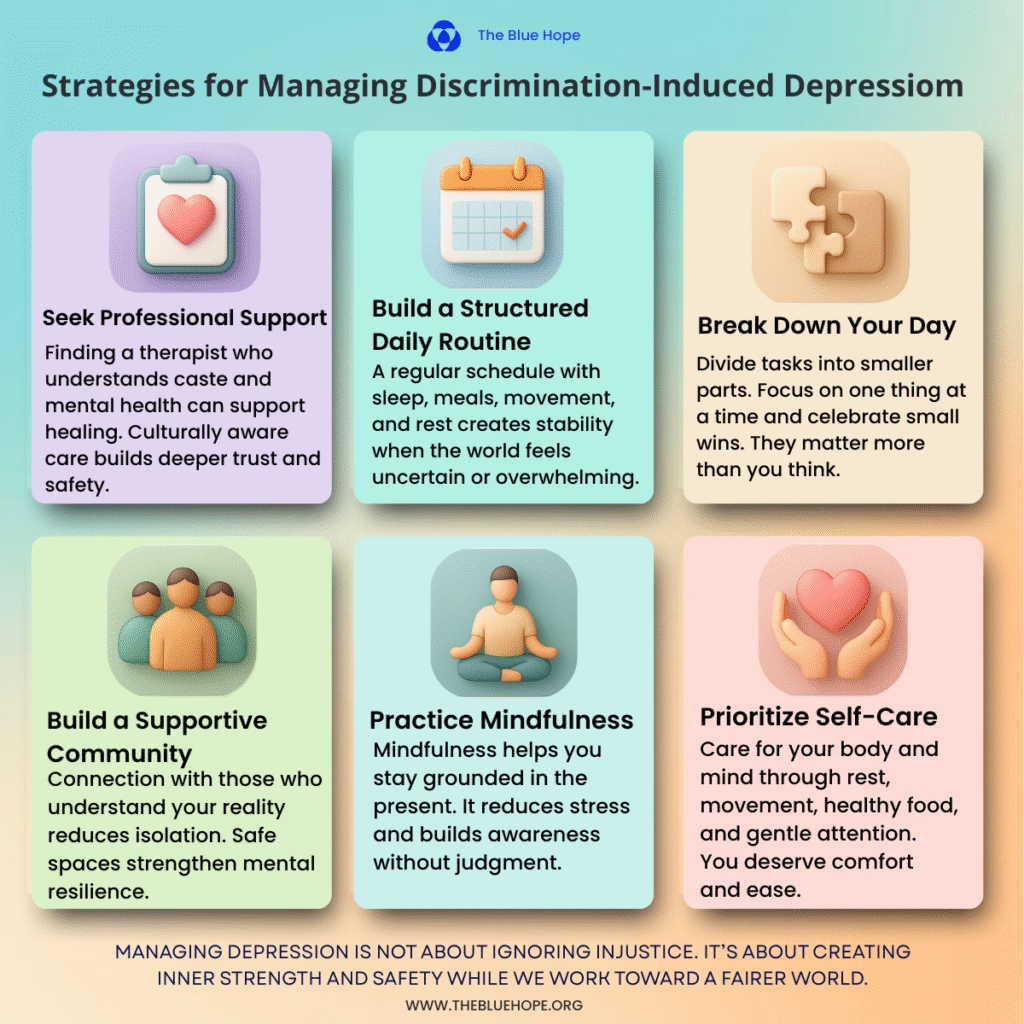
Addressing Negative Thinking Patterns & Solutions
Discrimination can create deeply ingrained negative thought patterns about yourself and your place in the world. Addressing these thoughts is an important part of healing.
Common Negative Thinking Patterns in Caste-Based Contexts
1. Internalized Casteism
Thought: “Maybe I am less capable than others.”
Reality: This thought comes from a lifetime of being told, directly or indirectly, that your caste defines your value.
Reframe: “My worth is not defined by an unjust system. I have potential, like anyone else.”
2. Impostor Syndrome
Thought: “I don’t belong in this college/job. They’ll soon find out I’m not good enough.”
Reality: Due to structural exclusion, Bahujans often don’t see people like themselves in spaces of power, which leads to doubt.
Reframe: “I worked hard to get here. My presence challenges inequality, and that’s powerful.”
3. Overgeneralization
Thought: “Every time I speak up, I’m ignored. Maybe I should stop trying.”
Reality: Past incidents of being silenced or excluded can create a belief that it always happens.
Reframe: “It has happened before, but that doesn’t mean it will always happen. I have a voice, and it matters.”
4. Self-Blame
Thought: “Maybe if I tried harder, they would respect me.”
Reality: Disrespect and discrimination are systemic problems, not personal failures.
Reframe: “The system is unfair. I deserve respect regardless of how hard I work.”
5. Catastrophizing
Thought: “If I fail this one thing, everything is over for me.”
Reality: In a system stacked against us, every opportunity can feel like the last one.
Reframe: “One setback doesn’t define my whole journey. I can learn and grow.”
6. Comparison with Privileged Groups
Thought: “Upper caste students do better because they’re smarter.”
Reality: They have had generations of access, guidance, and privilege. That is not intelligence, it is systemic advantage.
Reframe: “I’m building from the ground up. That is strength, not weakness.”
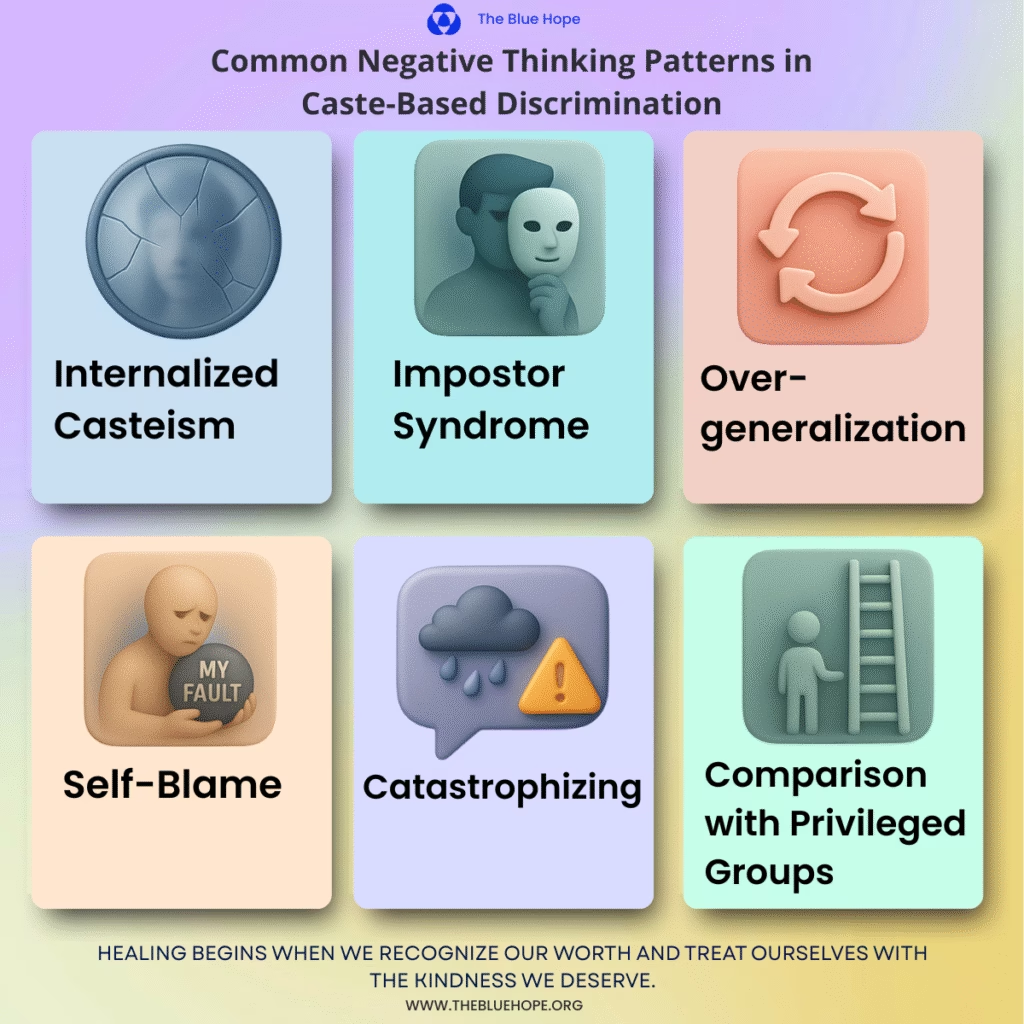
Cognitive-Behavioral Techniques for Challenging Negative Thoughts
Cognitive-behavioral therapy (CBT) techniques can help identify and change irrational thought patterns that contribute to emotional distress. While working with a therapist trained in CBT is ideal, you can begin practicing some techniques on your own:
- Identify negative thoughts when they arise
- Question the evidence for these thoughts
- Consider alternative perspectives
- Replace distorted thoughts with more balanced ones
For example, if you think “I only got this position because of reservations, not because I’m qualified,” challenge this by listing your qualifications, skills, and the value you bring.
Cultivating Self-Compassion
Self-compassion means treating yourself with the same kindness you would offer a good friend. Research shows that self-compassion can be particularly healing for people who experience discrimination.
Practice self-compassion by:
- Acknowledging your pain without judgment
- Recognizing that many others share similar struggles
- Speaking to yourself with kindness rather than criticism
- Offering yourself comfort during difficult moments
Remember that experiencing depression in response to discrimination is not a weakness—it’s a natural response to prolonged injustice.
Reclaiming Your Narrative and Identity
An essential part of healing from discrimination-induced depression is reclaiming your narrative and reconnecting with your identity in affirming ways.
Connecting with Bahujan History and Resistance
Learning about Bahujan history, achievements, and resistance can be powerfully affirming. Throughout history, Bahujans have shown tremendous resilience and created profound contributions to society, often in the face of severe oppression.
Explore:
- Writings by Bahujan scholars and activists
- Art, music, and literature that celebrates Bahujan experiences
- Historical and contemporary movements for justice and equality
- Stories of everyday resistance and triumph
This knowledge can help counter the negative narratives imposed by a casteist society and provide models of strength and possibility.
Finding Strength in Collective Action
Many people find that engaging in collective action for social change helps alleviate depression by creating a sense of purpose and community. While discrimination is a systemic problem that no individual can solve alone, joining with others to create change can be empowering.
Consider:
- Joining advocacy organizations working for caste equality
- Supporting educational initiatives about caste discrimination
- Participating in community mutual aid efforts
- Sharing your story when it feels safe to do so
Remember that taking care of your mental health is itself a form of resistance in a system that has historically denied the humanity and emotional needs of Bahujans.
Practicing Cultural Affirmation
Reconnecting with cultural practices, traditions, and values that affirm your identity can be healing. This might include food, language, music, spiritual practices, or community celebrations that have meaning for you and your community.
Creating space in your life for these practices honors your heritage and provides a counterbalance to experiences of discrimination.
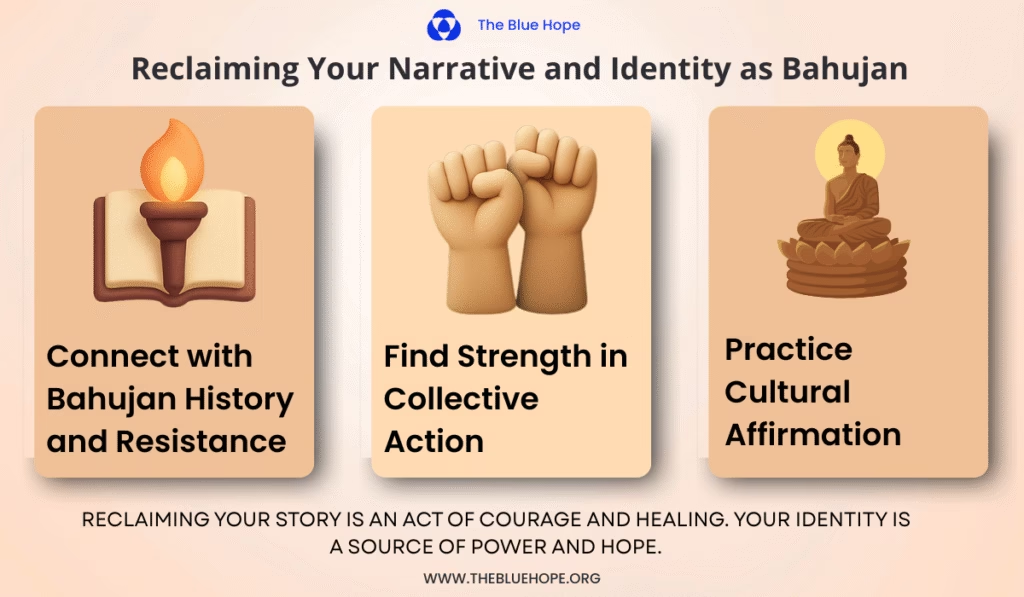
Addressing Common Concerns
Q1: How do I deal with depression when my struggles are rooted in real systemic problems?
This question highlights an important truth: your depression isn’t just “in your head.” It is connected to real social injustice. The key is to recognize that while you may not be able to change the system immediately, you can develop tools to protect your wellbeing within it.
Focus on what you can control: your self-care practices, the people you surround yourself with, how you respond to discrimination, and the spaces where you invest your energy. When you feel ready, combine this with thoughtful participation in collective efforts for change.
Q2: What can I do if therapy is not accessible or affordable?
Access to mental health care remains a significant challenge, particularly for marginalized communities. If traditional therapy isn’t accessible, consider:
- Community health centers that offer sliding-scale fees
- Support groups (in-person or online) focused on discrimination and mental health
- Mental health apps and online resources
- Books on depression, discrimination, and healing
- Peer support networks in your community
While these alternatives don’t replace professional care, they can provide valuable support and tools for managing depression.
Q3: How can I heal from discrimination when it’s a daily reality?
Healing does not mean you will never feel hurt by discrimination again. It means building resilience—the ability to face discrimination without losing your sense of self or your hope for the future.
Try to recognize discrimination for what it truly is: a reflection of societal bias, not a measure of your worth. Establish routines that help you process and release painful emotions. Set healthy boundaries that reduce your exposure to particularly harmful or toxic environments whenever possible.
Q4: Are there Bahujan-specific support networks for mental health?
Resources focused specifically on the intersection of caste and mental health are still emerging. However, organizations like The Blue Dawn are working to connect individuals with therapists who understand these issues. Online communities and social media groups can also offer connection, understanding, and encouragement.
You can also consider reaching out to Bahujan student associations, local community groups, or advocacy organizations that may offer supportive networks or direct you to helpful resources.
Dispelling Common Myths
Myth: Depression is a sign of personal weakness
Reality: Depression is a health condition with biological, psychological, and social causes. When it stems from discrimination, it represents a natural response to chronic stress and injustice, not a personal failing. In fact, surviving and functioning while experiencing discrimination demonstrates remarkable strength.
Myth: You should be able to handle discrimination without it affecting you
Reality: Humans are inherently social beings, wired to be sensitive to rejection and exclusion. Experiencing emotional pain in response to discrimination is normal and universal. No one is immune to the psychological effects of being treated as “less than.”
Myth: Focusing on mental health distracts from fighting systemic discrimination
Reality: Taking care of your mental health and working toward systemic change aren’t mutually exclusive—they’re complementary. Attending to your wellbeing helps ensure you have the emotional resources to engage in social justice work sustainably.
Moving Forward: Hope and Healing
Healing from discrimination-induced depression is not easy. But it is possible. And you do not have to walk this path alone. For generations, Bahujans have carried the deep wounds of caste-based exclusion. Alongside those wounds, they have also carried something just as powerful: the strength to survive, the courage to speak, and the determination to reclaim dignity.
Your pain is not a flaw. It is a natural and valid response to years of injustice. The sadness, the anger, the weariness you feel are not signs of weakness. They are signs that your heart still hopes for a better world, that you still believe change is possible.
You are not alone. Across classrooms, workplaces, and homes, many Bahujans carry the same silent burdens. But within our communities, there is also connection. There is laughter, love, support, and understanding. You are part of something larger. You belong to a history of people who have resisted dehumanization with dignity and who continue to rise.
Each act of care you give yourself is a quiet act of resistance. Whether it is resting without guilt, speaking kindly to yourself, or reaching out to someone who understands, these small moments build strength. They teach your mind and body that you are worthy of healing.
Individual healing and collective change are deeply connected. Every time you protect your mental health, you challenge a system that benefits from your silence. You remind the world, and yourself, that your wellbeing matters. Your story matters. And your life holds meaning beyond what caste society tells you.

You are more than what has been done to you. You are shaped not only by struggle but also by survival, love, and vision. You are the hope of those who came before you, and the light for those yet to come.
Let your healing be powerful. Let your joy be brave. Let your voice be heard, even if it shakes.
“We are not here merely to exist. We are here to remake this world, to make it just and kind and full of dignity, for ourselves and for those yet to come.”
— Dr. B. R. Ambedkar
You belong. You matter. Your healing is important.
And no matter how heavy the past has been, your future is still yours to shape.

